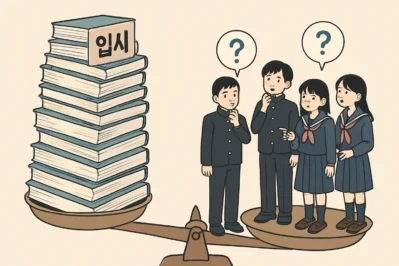The Great Debate: How to Master Korean Education News!
Hello! It’s Maeil Hangeul, here to upgrade your Korean skills!
Today, we’re tackling a topic you’ll see everywhere in Korea: education. But we’re not just learning vocabulary; we’re learning how to read the news about it like a pro. This will help you understand deeper conversations and even share your own opinions on a subject that Koreans are incredibly passionate about.
Lately in Korea, there’s a huge buzz about new college admission policies and the intense competition for private academies (hagwons). The news is filled with articles, debates, and strong opinions. Let’s learn the key phrases you need to understand what’s really going on!
Core Expressions You Need to Know
Here are the essential phrases to help you decode the debates.
1. 논란이 되다 (non-ran-i doe-da)
* Pronunciation [Romanization]: non-ran-i dwe-da
* English Meaning: to become controversial; to be the subject of controversy
* Detailed Explanation: This is a phrase you’ll see constantly in headlines. 논란 (non-ran) means “controversy,” and 되다 (doeda) means “to become.” It’s used when a specific issue, policy, or event sparks a heated public debate with many different opinions. It’s a neutral way to state that people are arguing about something.
2. 찬반 논쟁 (chan-ban non-jaeng)
* Pronunciation [Romanization]: chan-ban non-jaeng
* English Meaning: a pros and cons debate; a for-and-against argument
* Detailed Explanation: This is a fantastic noun for describing the debate itself. It’s a combination of 찬성 (chan-seong – approval/pro) and 반대 (ban-dae – opposition/con), plus 논쟁 (non-jaeng – debate). When you see 찬반 논쟁이 뜨겁다 (the pro-con debate is hot), you know the issue is seriously dividing people.
3. 입시 경쟁 (ip-si gyeong-jaeng)
* Pronunciation [Romanization]: ip-si gyeong-jaeng
* English Meaning: college entrance exam competition
* Detailed Explanation: This is a fundamental concept in Korean society. 입시 (ip-si) is short for 입학 시험 (ip-hak si-heom), meaning “entrance exam,” and 경쟁 (gyeong-jaeng) means “competition.” The phrase refers to the notoriously fierce competition among students to get into a good university. Understanding this term is key to understanding Korean culture.
4. ~에 따르면 (e tta-reu-myeon)
* Pronunciation [Romanization]: ~e tta-reu-myeon
* English Meaning: According to ~
* Detailed Explanation: This is a crucial grammar point for reading and discussing news. You attach it to a noun (the source of the information) to report what that source said. It’s more formal than just saying “someone said” and is used to cite reports, articles, or experts. For example, 뉴스에 따르면 (nyu-seu-e tta-reu-myeon) means “According to the news.”
Example Conversation
Let’s see how these expressions are used in a real conversation about the latest education news.
A: Did you see the news about the new college admission policies? It’s really causing a stir.
(새 입시 정책에 대한 뉴스 봤어? 완전 논란이 되고 있더라.)
B: I did. There’s a fierce 찬반 논쟁 online about whether it’s fair or not.
(응, 봤어. 공정한지에 대해 온라인에서 찬반 논쟁이 뜨거워.)
A: It feels like the 입시 경쟁 is just getting more intense for students.
(학생들한테는 입시 경쟁이 점점 더 치열해지는 것 같아.)
B: For sure. 한 전문가에 따르면, this change might actually increase spending on private education.
(정말 그래. 한 전문가에 따르면, 이 변화가 오히려 사교육비를 증가시킬 수도 있대.)
Culture Tip & Trend Deep-Dive
Why is Education News a National Obsession?
In Korea, education has historically been seen as the primary path to success and social mobility. This creates an environment where the entire nation pays close attention to every little change in the education system. The 입시 경쟁 isn’t just a challenge for students; it’s a major topic of concern for parents, politicians, and the general public.
You’ve probably seen this intense pressure reflected in popular K-dramas like ‘Sky Castle’ or ‘Crash Course in Romance’. These shows aren’t pure fiction; they tap into the real anxieties and debates happening in society.
Pro-Tip: When discussing an education news article with a Korean friend, if you want to sound thoughtful and fluent, try saying something like: “이 문제에 대해서는 찬반 논쟁이 있을 수밖에 없겠네요.” (It makes sense that there would be a for-and-against debate on this issue.) This shows you understand the complexity of the situation!
Let’s Review and Practice!
Great job today! We learned four key expressions—논란이 되다, 찬반 논쟁, 입시 경쟁, and ~에 따르면—that will help you understand and discuss the hot topic of Korean education.
Now it’s your turn to practice!
- Fill in the blank:
- The new exam system is the subject of a heated ________.
- (새로운 시험 제도를 두고 뜨거운 ________이/가 벌어지고 있다.)
- Make a sentence:
- Try writing a short sentence using
~에 따르면to share a piece of news you recently heard. (e.g., “According to the weather forecast…”)
- Try writing a short sentence using
Leave your answers in the comments below! We’d love to see you use these new expressions. Keep up the great work






